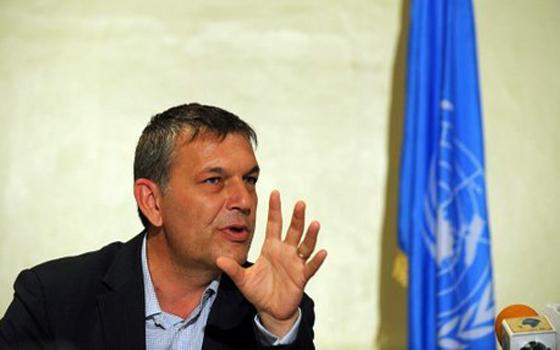International funding for Lebanon's 2017 refugee response plan demonstrates “sustained solidarity by the international partners but the level of disbursements needs to increase,” U.N. Resident and Humanitarian Coordinator for Lebanon Philippe Lazzarini has said.
“At the end of May 2017, committed resources to Lebanon amounted to USD 1.41 billion, which includes USD 1.10 billion in donor assistance and USD 309.6 million carried over from 2016 by partners and pooled funds,” as shown by the latest funding update released by the Lazzarini's office.
“For 2018 and beyond, donors have so far committed USD 350 million in support of Lebanon. A total of USD 236.3 million has been provided in the first quarter of 2017 to U.N. agencies and NGOs in support of activities under the Lebanon Crisis Response Plan (LCRP), which is less than half of the assistance reported last year during the same period,” the statement said.
While commending the solidarity towards Lebanon, Lazzarini stressed that continued support and faster deliveries are essential.
“While the data collected show that the aid to Lebanon in 2017 will most likely reach a similar volume as last year, it also highlights a lower level of disbursements in certain sectors at this time of the year, putting in jeopardy the smooth running of some critical activities as well as a lack of visibility regarding commitments beyond 2018,” the U.N. official warned.
Commenting on the pledges to Lebanon beyond 2018, Lazzarini added that “investment in stabilization and job creation programs need to scale up not only to anticipate the decrease of humanitarian funding, but also to fulfill our commitment to support Lebanon's social, economic, and environmental stability throughout the crisis and pave the way towards sustainable development.”
The Lebanon Crisis Response Plan (LCRP) 2017-20 was launched in February 2017. With a US$2.8 billion appeal, the LCRP brings together more than 104 partners to assist 2.8 million highly vulnerable people living in Lebanon. It aims to provide protection and immediate assistance to 1.9 million Syrian refugees, vulnerable Lebanese and Palestine refugees and deliver basic services to 2.2 million people as well as to invest in Lebanese infrastructure, economy and public institutions.
On April 5, the Supporting the Future of Syria and the Region Brussels conference brought together representatives of over 70 countries, international organizations and civil society to confirm commitments made last year in London and raise new funding to meet immediate and longer-term needs of people whose lives are being torn apart by the conflict.
Naharnet
8 June

























































